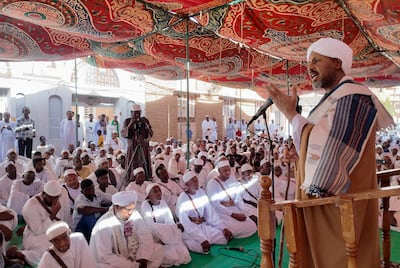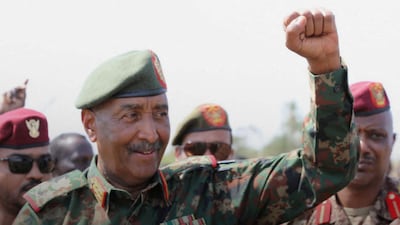Sudan's army chief Gen Abdel Fattah Al Burhan has said the military will fight on against the Rapid Support Forces until the paramilitary group is crushed or disarmed.
Gen Al Burhan has repeatedly vowed to continue the war until the RSF is defeated. But his latest pledge, made on the eve of the Eid Al Fitr, takes on added significance because it came days after his troops and allied volunteers recaptured the nation's capital, Khartoum, ending two years of RSF control.
“The joy of victory will not be complete until the last insurgent has been eradicated in the farthest corner of Sudan,” Gen Al Burhan said in a televised address.
“There will be no going back on defeating and crushing the terrorist Dagalo militia,” he added, in a reference to RSF commander and his one-time ally, Gen Mohamed Dagalo.
The army chief, who serves as Sudan's de facto leader, also ruled out negotiations with the RSF, saying it could only be spared defeat on the battlefield if it laid down its arms and surrendered. He has also said he would pardon RSF fighters who laid down their arms.
Gen Dagalo acknowledged the loss of the capital in a speech to his fighters posted on social media on Sunday. It came three days after the group said there would be "no retreat and no surrender" and that its forces had "repositioned".
"I confirm to you that we have indeed left Khartoum, but we will return with even stronger determination," Gen Dagalo said.
Wresting back control of the Sudanese capital capped a series of battlefield gains made by the army and its allies in the capital's greater region – comprising Khartoum, Bahri and Omdurman – and in central Sudan, home to the country's breadbasket Al Jazira region.
But the RSF remains in near full control of the vast western region of Darfur and holds sway over parts of Kordofan, in south-west Sudan. The only major city in Darfur still under army control is El Fasher, which has been besieged by the RSF since May last year.

The RSF's forerunner, the notorious Janjaweed militia, is accused of committing atrocities against civilians in Darfur in the 2000s.
The war in Sudan broke out on April 15, 2023, when months of tension between Gen Al Burhan and Gen Dagalo boiled over into open conflict. Tens of thousands of people have been killed in the fighting, at least 12 million have been displaced and infrastructure has been destroyed.
The war also created the world's worst humanitarian crisis, with about 25 million facing acute hunger. About eight million are on the brink of famine.
Gen Al Burhan and Gen Dagalo jointly staged a takeover in 2021 that toppled a civilian-led transitional government. The coup derailed Sudan's democratic transition after the removal in 2019 of long-time president Omar Al Bashir.
The two commanders have been accused by the International Criminal Court of war crimes and faced sanctions from the US in the final days of Joe Biden's administration.
The extent of destruction in Khartoum and its sister cities has been shown in videos posted online since the army recaptured the city. Footage shows damaged buildings and aircraft at Khartoum airport, as well as vandalised offices, shattered windows and debris strewn across floors.
The presidential palace has also sustained damage and was blackened by fires.
Gen Al Burhan flew to Saudi Arabia on Friday, his first foreign trip after the army retook the capital, and met Saudi Crown Prince Mohammed bin Salman. Sudanese Finance Minister Jibril Ibrahim said the two countries agreed to set up a joint committee to determine what is needed to restore normal life in Sudan, including basic services such as electricity, potable water and health care.
But while Khartoum may soon be put on the long road to recovery, the same cannot be said about other parts of the country, including Darfur.

Hours after Gen Al Burhan visited the presidential palace on Wednesday and declared the capital “free” of the RSF, the paramilitary group announced a military alliance with a faction of the Sudan People's Liberation Movement-North. The rebel group controls parts of South Kordofan and Blue Nile states in the south.
The group clashed with the army and the RSF in the early stages of the war. But it was among several political and rebel groups that signed a charter with the RSF last month, as a prelude to establishing a rival government.
Witnesses in the Blue Nile state capital of Damazin reported that its airport and the Roseires Dam came under drone attack by the RSF and their allies for the first time in the war, AFP reported on Thursday. The army later said it shot down the RSF drones.
On Saturday, the RSF claimed it had seized a military base, about 140km south-west of Damazin.


